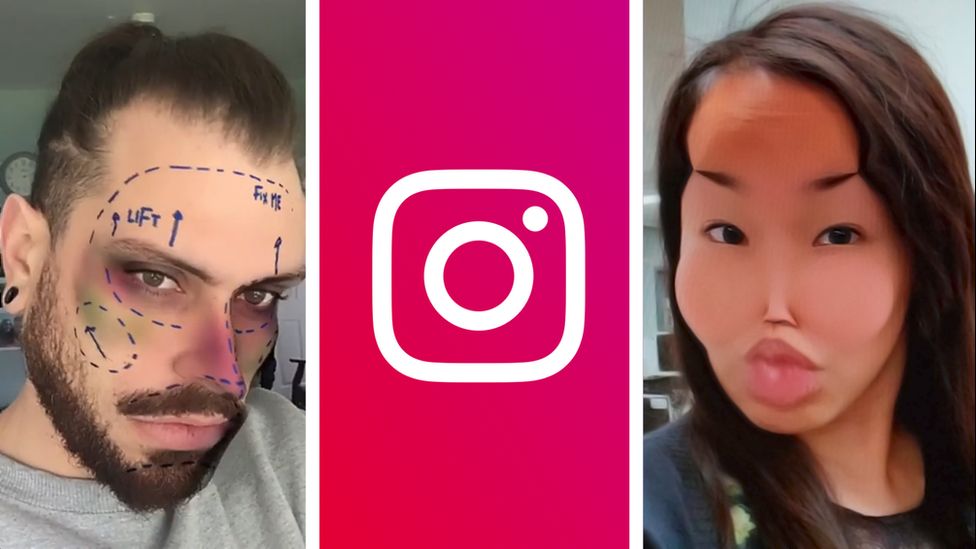Instagram bans 'cosmetic surgery' filters
- Published

Instagram is removing all augmented reality (AR) filters that depict or promote cosmetic surgery, amid concerns they harm people's mental health.
Effects that make people look like they have had lip injections, fillers or a facelift will be among those banned.
Research suggests face-changing filters can make people feel worse about the way they look.
Instagram, which is owned by Facebook, said the ban was about promoting wellbeing.
"We're re-evaluating our policies - we want our filters to be a positive experience for people," a spokesman said.
"While we're re-evaluating our policies, we will remove all effects from the [effects] gallery associated with plastic surgery, stop further approval of new effects like this and remove current effects if they're reported to us."
In August, an update to the Instagram app allowed users to create their own virtual effects, such as animations and custom face filters, that can be superimposed on images and videos.
Many popular filters - such as Plastica - mimicked the effects of extreme cosmetic surgery.
Allow Instagram content?
This article contains content provided by Instagram. We ask for your permission before anything is loaded, as they may be using cookies and other technologies. You may want to read Meta’s Instagram cookie policy, external and privacy policy, external before accepting. To view this content choose ‘accept and continue’.
Another filter - FixMe - showed how a cosmetic surgeon marked a person's face before procedures.
Its creator, Daniel Mooney, told the BBC: "FixMe was only ever supposed to be a critique of plastic surgery, showing how unglamorous the process is with the markings and bruising.
"My intention was not to show a 'perfect' image, as you can see in the final result. Perfection is over-rated.
"I can see where Instagram is coming from, but for as long as some of the most-followed accounts on Instagram are of heavily surgically 'improved' people, removing surgery filters won't really change that much."
Instagram said it was unsure how long it would take to remove all of the filters but many users welcomed the ban.
"Most people just pass filters off as 'girls having fun' and to just let girls enjoy things - but when you haven't posted a photo without one of these filters since 2016, then it clearly is something deeper than just 'fun'," one user said on Twitter.
However, some users said they would miss the effects.
"Has Instagram also considered me and what I'm supposed to do when I'm having a day where I look more clapped than normal? Old haggard witches need to look stunning too," tweeted one.
Research suggests excessive use of social media can cause feelings of depression - although some dispute those claims.
In February, Instagram said it would remove all graphic images of self-harm from the platform, amid concerns they could affect young and vulnerable people.
It followed the death of 14-year-old Molly Russell, who killed herself in 2017 after viewing graphic images of self-harm on the site.
- Published7 February 2019
- Published10 February 2018
- Published19 May 2017